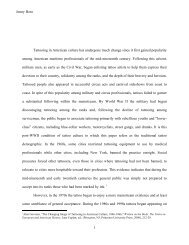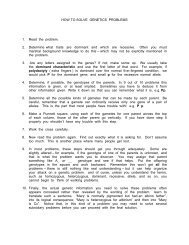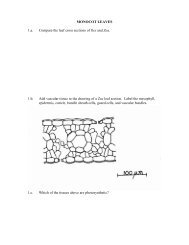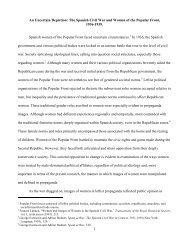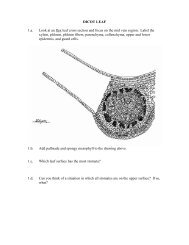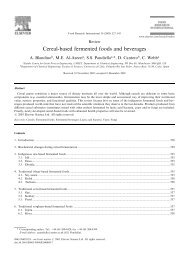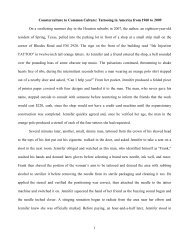Meat - Facing the Dilemmas
Meat - Facing the Dilemmas
Meat - Facing the Dilemmas
You also want an ePaper? Increase the reach of your titles
YUMPU automatically turns print PDFs into web optimized ePapers that Google loves.
Nicholas SaphirAt <strong>the</strong> beginning of <strong>the</strong> 1960s we spentaround 28 percent of our disposable incomeon food and drink. Food shortages andrationing were of recent memory, chickenand salmon were luxuries. Today we spendless than 12 percent. Intensively reared £2chickens and farmed salmon are now staplefoods.Range, innovation, functional benefits andquality are already becoming <strong>the</strong> drivers ofchoice with price becoming less important.Animal welfare matters and focus groupscontinue to influence UK legislation. Butmany consumers still buy intensively rearedpoultry, eggs, dairy products and importedveal.So what will change over <strong>the</strong> next 40 years?The developing world will continue todemand more animal protein as disposableincomes increase. Animal welfare will notbe a major concern for those who will beenjoying a full diet for <strong>the</strong> first time. For<strong>the</strong> developed world, campaigns againstobesity and increasing awareness of <strong>the</strong>environmental damage caused by livestockproduction will be <strong>the</strong> key drivers that movefood consumption towards quality ra<strong>the</strong>rthan quantity. Here animal welfare will beof growing interest to consumers but comesecond to quality and environmental cost.will challenge many who have based<strong>the</strong>ir business model around commodityproduction. Our growing understandingof environmental costs may surprise us:‘seasonality’ and ‘local’ may be easy catchwordsto focus our thinking, but we do notyet know whe<strong>the</strong>r evidence will support areturn to basics. The true environmentalcost of shipping ‘out of season’ produce,even refrigerated, may prove to be farlower than <strong>the</strong> environmental cost of ‘inseason’ local alternatives. If environmentalevidence supports a move towards longlifemilk and consumers accept <strong>the</strong> call, <strong>the</strong>whole UK dairy industry could change, witha resurgence of low cost spring production.If reducing pollution from livestock requiresfundamental changes in feeding regimestowards or away from grass fed production,<strong>the</strong> challenge to UK farming could befundamental.We have much still to understand. However,what is important is that with change,especially a move towards quality, innovationand environmental improvements, comesopportunity. The end of production subsidieswas just <strong>the</strong> start of a UK farming revolutionthat will require change to be embracedra<strong>the</strong>r than feared.Nicholas Saphir is Executive Chairman of OMSCo,<strong>the</strong> organic milk suppliers’ co-operative.www.omsco.co.ukColin TudgeIf things go on as <strong>the</strong>y are <strong>the</strong>n we’vehad it. By 2050 much of our farmlandwill be under water and what’s left willbe used for livestock feed or biofuel.Most people will not be fed at all (andsombre politicians and intellectuals willtell us <strong>the</strong> world is overpopulated).But we could in <strong>the</strong> next few decadesestablish agriculture that is actuallydesigned to feed people. In my latestbook, Feeding people is easy, I call this‘Enlightened Agriculture’. The focuswould be on staples, grown on <strong>the</strong>arable scale, plus varied horticulture.Animals would be slotted in wherever<strong>the</strong>y were complementary: sheepand cattle fed primarily on grass andbrowse, in places where food cropsare hard to grow; pigs and poultryfed on surpluses and leftovers. Thesystems would be intricate and hencelabour-intensive – all economiesshould have a strong agrarian base.Husbandry, including animal welfare,would be excellent. Such farms wouldproduce ‘plenty of plants, not muchmeat, and maximum variety’ – whichin nine words summarises modernnutritional <strong>the</strong>ory and is <strong>the</strong> basis of all<strong>the</strong> world’s great cuisines.But if we (humanity) are to achieveEnlightened Agriculture, <strong>the</strong>n we haveto take matters into our own hands.If we rely on <strong>the</strong> present-day powersthat-bewith <strong>the</strong>ir crude, obsessivelymonetised and ruthless economy, <strong>the</strong>nwe are dead. We need a people’s buyoutof <strong>the</strong> world’s food supply chain.With a growing band of friends, I’mworking on it.Where does that leave UK farming? Thetrend away from a price-based, volumedrivenculture is good news, though itTemple GrandinThe most powerful engines that drive change are economic. The tremendouspurchasing power of large food companies can bring about huge improvements.In 1999 I implemented animal welfare audits of <strong>the</strong> US slaughter plants thatsupplied McDonald’s Corporation and Wendy’s International. During thatyear I saw more improvements than I had seen in a 25-year career priorto it. When major meat buying customers insisted on improvements, majorchanges occurred.Colin Tudge’s latest book, Feeding people is easy,is available from Pari Publishing.You can find out about his buy-out atwww.colintudge.comHow was change brought about? Activist NGOs bring attention to animalwelfare issues but, if that is where things stop, <strong>the</strong> executives of mostcorporations treat such concerns as abstractions to be left to <strong>the</strong>ir legal orpublic relations department. l took executives on <strong>the</strong>ir first tours of farms andslaughter plants. When <strong>the</strong>y saw good practices <strong>the</strong>y were pleased and when<strong>the</strong>y saw emaciated, neglected animals <strong>the</strong>y were horrified. Welfare was nowno longer an abstraction and <strong>the</strong>y implemented changes.To direct <strong>the</strong>se huge economic forces into changes that work requires peopleto work on farms and slaughter plants to develop practical new systems. Weneed lots of young people to work in <strong>the</strong> field to implement new farmingsystems.I have worked for over 35 years designing and implementing practical systemsfor handling animals. Legislation and policy making that occur in cities faraway from farms are not enough to make real, effective improvements.Temple Grandin is a professor of animal sciences at Colorado State University. Half <strong>the</strong> cattle in <strong>the</strong>US and Canada are handled in equipment she has designed for meat plants.lamar.colostate.edu/~grandin/www.foodethicscouncil.org | Volume 2 Issue 4 | Winter 2007 11




